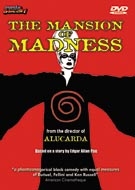
Five years before turning convents inside out with that delicious combination of devils and nymphets in ALUCARDA, cult director Juan Lopez Moctezuma focused his energies on that other irresistible institution, the madhouse. Despite being a little more reputable than its exploitation 'cousin', MANSION OF MADNESS is yet another remarkable bit of exotic weirdness, courtesy of those fine people at Mondo Macabro.
Returning to his homeland of France, Leblanc (Arthur Hansel) travels with his friend Julien, Julien's cousin Blanche and his coach driver to a remote asylum situated by the fog shrouded country woodlands, in order to write an article on the controversial director of the place, Dr. Maillard. Arriving at the gates, the group are reluctantly allowed through by the trigger-happy men guarding the place.
Making their way, the group are interrupted by a monk bellowing "Lucifer!" at a crazed victim rolling on the floor. Blanche announces that she'd rather go home, and so Leblanc proceeds alone. Met by a burly priest, he is taken through a huge stone chamber to a luxurious mansion, where he finally meets Maillard, sipping wine and listening to harp music played by his apparent niece, Eugenie (Ellen Sherman).
Leblanc is then given a guided tour by his host, who lets him in on the secret of his "soothing system" that he uses to allegedly cure his patients. Progressing from one bizarre locale to another, through a steaming industrial zone, a furnace and a barn, it becomes apparent that Maillard is encouraging his patients' madness, including a man who thinks he's a chicken, who struts around eating bird food and a girl who invents machines that never work.
Arriving at the dungeon, Leblanc finds a starving, emaciated old man chained to a cross. Dismissing Maillard as cruel, the roving journalist is drugged and incarcerated. Discovering that his captor is really an impostor, an insane former patient who revolted and took over the asylum, he attempts to escape and searches for the real Maillard…
If, as veteran director Jean Rollin once remarked, surrealism is characterised by the strange relation between the various elements, MANSION OF MADNESS qualifies. Featuring an amazing chain of settings and situations that seem to have little or no logical relation to one another, such as an enormous stone chamber, a smoking industrial zone, and a rat-infested, torch-lit dungeon inscribed with Dante's "Abandon hope all ye who enter here", it comes across as a madhouse version of WILLY WONKA & THE CHOCOLATE FACTORY laced with fight scenes and nudity.
Throughout the film, Moctezuma demonstrates a wonderful visual sense. Avoiding mostly the violent montage style that would characterise that more agitating, more physical ALUCARDA, the director here allows the camera to rest on the extraordinary tableau. Photographed with an earthy texture, almost every individual image is lovingly crafted. With set pieces such as massive temple decked out with patients trapped in glass cases, and a feast complete with a naked girl on a white pony in the background, almost every image could be a weird and wonderful museum piece.
In spite of this, Moctezuma does at times use that punchy, exaggerated combination of sound and image that perhaps provides the link between Alejandro Jodorowsky's EL TOPO (produced by Moctezuma) and his own ALUCARDA. The film uses exaggerated sound effects to amplify its set pieces, such as a maniac who laughs like a crazed monkey, as he rapes the timid Blanche. Brook puts in an excellent performance as the villain, dealing with alarming shifts in tone as he moves effortlessly from hilarity to cruelty. Despite the rather simplistic content - revolving around the patients-ruling-the-doctors reversal - on the whole it's a great little excursion into the grinning mouth of madness.
Presented in the original full screen format, the film looks sharp and clean, and despite warnings of various bits of print damage, is exceptional. Thankfully, the film features the Spanish audio track, which is a marked improvement on the slightly distracting English one. Extras are the same as the ALUCARDA DVD (interview with Guillermo del Toro, feature on J.L. Moctezuma), aside from a text interview with Moctezuma, where he discusses his theatrical background, involvement with Jodorowsky and his surrealist inspirations. We also get a stills gallery and theatrical trailer, but the amazing film is the reason to buy.
Review by Matthew Sanderson
| Released by Mondo Macabro |
| Not Rated - Region All (NTSC) |
| Extras : |
| see main review |